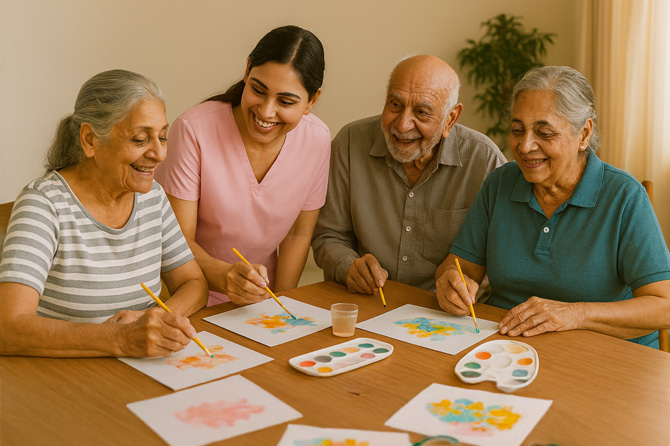— A Love Letter for the Middle of Life
There are moments that don’t arrive like thunderstorms. They come softly—like a change in the wind. Not loud. Not sudden. But steady, quiet, and irreversible.
It starts small.
You notice them standing in a room they’ve known forever… but suddenly, they seem unsure of why they’re there.
You hear it in their voice—pausing mid-sentence, forgetting a word.
You feel it in their hands—the same hands that steadied your first steps, now trembling as they reach for yours.
You’re no longer just their child.
You’re their caregiver.
And they—your once indestructible parents—are now the ones needing protection.
So, how do you care for parents who can no longer care for themselves? You start by becoming their steadiness, their memory, their advocate. But even more than that—you become their safe place. Caring for parents is not a checklist. It’s a chapter.
Not of control. But of connection.
Not just responsibility. But reverence. No parent wants to be dependent. And no child wants to watch their heroes become frail. But here we are. And the truth is: aging isn’t a tragedy—it’s a transition. A deeply human one. So, if you’re in this season right now, like I am—here’s what I’ve learned: Let go of guilt. Let go of denial. Look them in the eye and say: “I see you. I honour who you were. And I will walk with who you are becoming.” And then, when you’ve said that to them—and to yourself—you begin. The Practical Side: Because Love Needs a Plan Yes, this is emotional. But it’s also logistical. And we need to get real about both. 1. Medical Needs
Ask:
- Are they managing chronic conditions like diabetes, hypertension, or arthritis?
- Do they need help getting to appointments?
- Are meds being taken correctly?
- Do they struggle with mobility?
Understand their ADLs and IADLs:
- ADLs: bathing, dressing, eating, toileting, transferring
- IADLs: cooking, cleaning, finances, shopping, using transport
Even if they’re not diagnosed with dementia, ask:
- Are they showing signs of anxiety, withdrawal, or depression?
- Do they seem isolated or disconnected?
- Are they afraid to ask for help because they don’t want to burden you?
And above all— don’t reduce them to a list of tasks.
Yes, medications and appointments matter. But so does sitting quietly on the porch together. Feeding the birds. Making tea. Watching it steep. Sharing the silence. Because care isn’t just doing. It’s being.
Say:- “You look beautiful in that colour, Ma.”
- “Dad, when your eyes light up seeing your grandson—my day is made.”
These moments matter more than we realize.
Don’t Erase Them in the Name of EfficiencyIt’s easy to just “do it all” because it’s faster.
But what if helping doesn’t mean taking over?
What if dignity means letting them stir the soup, fold the towel, tell the same story for the hundredth time?
Even if it’s slower, messier—it keeps them human. It keeps them themselves.
Instead of saying,
"Let me do it for you,"
try,
"Let's do it together."
They are not fragile glass.
They are fading royalty —kings and queens who built your world. Treat them that way.
Create a Sacred Space, Not Just a Safe OneWherever they are—your home, theirs, or assisted living—it should feel familiar and sacred, not sterile.
Here’s how:
- Soft lighting, familiar smells.
- A favorite chair by the window.
- Photos from their youth, calendars of today.
- Install grab bars. Non-slip mats. Raised toilet seats. Shower chairs.
- Keep essentials on the ground floor.
- Invite an occupational therapist to walk through the space with you.
This isn’t just safety. This is storytelling. This is sanctuary.
Words Still Matter—Especially When Time is ShortTalk. About memories, about fears, about the little things. Because even when bodies weaken, the pain of not being heard hurts more.
Ask:- “What do you still dream of doing?”
- “What makes you feel most like yourself?”
- “What do you miss the most?”
Include them in decisions. Let them feel seen—not sidelined.
Purpose doesn’t retire. Whether it’s gardening, faith, writing, or simply folding clothes—let them continue to contribute, in whatever way they can.
Know This: You Can’t Do It AllAnd that doesn’t mean you’ve failed.
Bringing in a caregiver, or choosing assisted living, doesn’t mean giving up. It means choosing wisely. With love. With respect.
Yes, it’s overwhelming—nurses, senior communities, memory care centers. But remember:
It’s not about doing everything alone.
It’s about doing the most important things with love.
- Can I still make time for presence, even if I outsource the tasks?
- Can I protect their dignity while ensuring they’re cared for?
That balance? That’s the goal.
And Please, Don’t Forget YourselfWe don’t talk about this enough, but caregiver burnout is real.
You’re in your late 40s or early 50s. You might be parenting your own kids, juggling work, managing a thousand things—and now, you’re parenting your parents too.
It’s okay to feel tired. It’s okay to feel resentful sometimes.
But don’t let yourself fall apart.
Because you matter, too. And caring for yourself is part of caring for them.
Breathe. Take breaks. Ask for help. Seek support groups, therapy, or simply a friend who gets it.
Final Thoughts: This Is a Love StoryThis isn’t just elder care. It’s a love story written in reverse.
From their sleepless nights for you,
to your quiet, devoted nights for them.
From their steady hands holding yours,
to your trembling hands now holding theirs.
Ask:
“Am I doing it with love?”
If the answer is yes—then you're already doing something beautiful.
Because this isn’t about getting everything perfect.
It’s about writing a story of love—day by day, gently, courageously.
A love letter written with touch, patience, and presence.
A circle where the end softly mirrors the beginning.
Somewhere between medicine and memories,
between independence and surrender,
you become the love they once were.And that, my friend, is everything.
